Keyplay Alternatives
A direct comparison of 10 alternatives to Keyplay. We review features, pricing, and use cases to help you make an informed decision.

You might be using Keyplay for its strengths in account selection. It’s a solid tool for go-to-market teams, helping to find, pick, and track ideal accounts with precision. It performs well when you need to build specific account lists for your team.
However, like any tool, it has some limitations. Some users report occasional filtering issues or outdated data. For this reason, we analyzed the best alternatives based on G2 reviews to help you find the right fit. Let's get started.
Consider 11x for Digital Sales Workers
If your team wants to use digital workers for sales, 11x is a platform to consider. It lets you deploy autonomous agents to handle parts of your sales process and support your existing team's activities.
11x is a GTM platform that uses AI agents to automate the sales process. Its agent Alice finds prospects, conducts outreach through email and LinkedIn, and updates your CRM.
Another agent, Julian, qualifies inbound leads and schedules meetings. The platform combines tools for data enrichment, outreach, and email warmup, which can replace multiple separate solutions in your stack.
Keyplay Alternatives
The following section provides a detailed breakdown of Keyplay alternatives. Each option is examined based on its features, price, and how it stacks up against Keyplay in terms of pros and cons.
1) ZoomInfo SalesOS
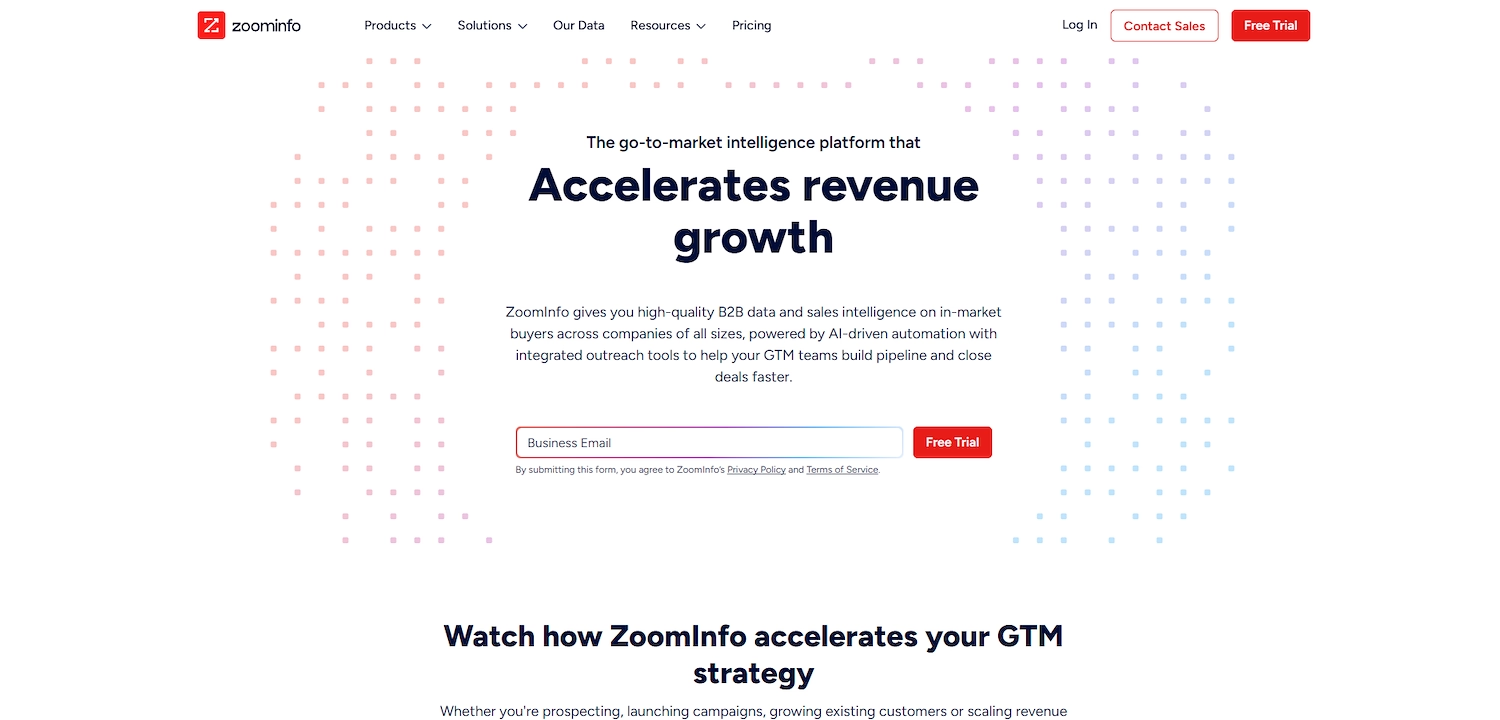
ZoomInfo SalesOS is a GTM intelligence platform for B2B organizations. It unifies company and contact data with buyer-intent signals to help your teams find and connect with valuable buyers. The system acts as a central data source for sales and marketing efforts.
You can use it to build prioritized lead lists from verified contact data. The platform also helps find in-market accounts for your pipeline and supports campaign launches with its enriched data.
ZoomInfo SalesOS's Main Features
- Analyzes every call and meeting interaction with conversation intelligence.
- Identifies anonymous website visitors to turn page views into pipeline.
- Uses a generative-AI companion to find insights and draft outreach.
- Offers web-form optimization to shorten forms and increase conversions.
Where ZoomInfo SalesOS Outperforms Keyplay
Average Review Score: 4.5/5 stars based on 8,738 G2 reviews.
- Unlike Keyplay, which centers on building account lists, ZoomInfo SalesOS provides conversation intelligence to analyze sales calls and meetings for insights.
- The platform identifies anonymous website visitors to create new leads. This offers a different approach to pipeline generation compared to Keyplay's account tracking methods.
- Its generative-AI companion helps find insights and draft outreach messages, adding a layer of automation for sales communication not found in Keyplay.
- Compared to Keyplay, which some users report has occasional data issues, ZoomInfo SalesOS offers a more extensive database that includes buyer-intent signals for broader GTM intelligence.
Potential Drawbacks Compared to Keyplay
- ZoomInfo SalesOS offers a wide range of features beyond simple account selection. For teams that only need to build and track account lists, the platform might feel more complex than Keyplay's specialized approach.
- Some users report that its large database can occasionally contain outdated contact information. This may require more verification from your team compared to the focused data sets in Keyplay.
- The tool's broad capabilities often come with a higher cost and a longer setup period. This is different from Keyplay, which provides a more targeted solution that can be quicker to adopt.
Budget and Value Comparison
Keyplay provides transparent pricing with a free preview, a Growth plan at $12,000 per year, and a Scale plan starting at $24,000 annually. In contrast, ZoomInfo SalesOS does not publish its pricing and requires a custom quote, which is common for enterprise-level platforms with more extensive features.
2) Apollo.io
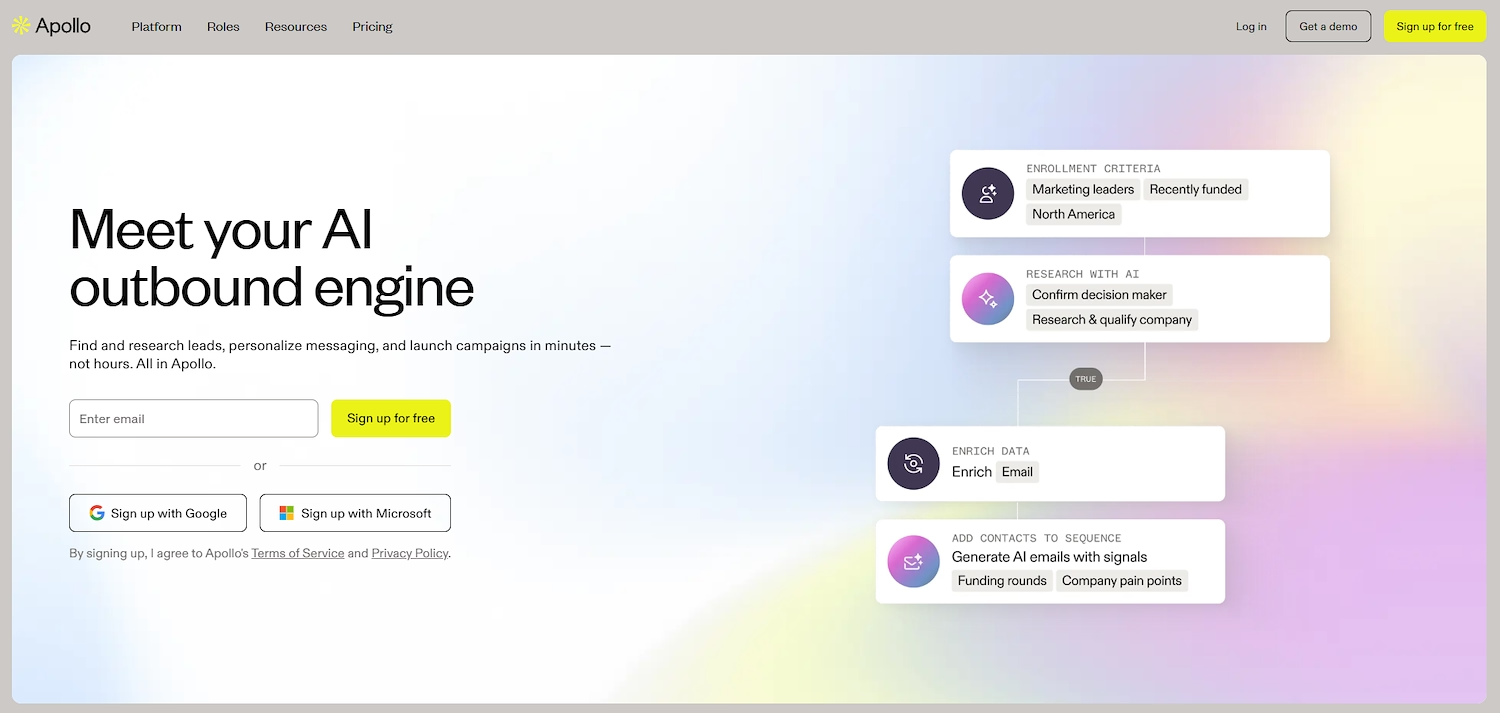
Apollo.io is a sales intelligence platform that offers a B2B database. It is designed to help go-to-market teams with lead generation and prospect engagement.
Users can find verified contact information, build targeted account lists, and execute outreach sequences. The platform combines data with workflow automation to support the sales process from start to finish.
Apollo.io's Main Features
- Offers a B2B database to find leads and engage prospects.
- Executes outreach sequences to connect with potential customers.
- Combines contact data with workflow automation to support the sales process.
Where Apollo.io Outperforms Keyplay
Average Review Score: 4.7/5 stars based on 8,904 G2 reviews.
- Apollo.io provides an all-in-one sales platform that includes outreach automation and deal management. This is different from Keyplay, which focuses primarily on account selection and list building.
- Its engagement suite automates outreach sequences. This allows teams to contact prospects directly, a step beyond Keyplay's focus on account identification.
- The platform includes a B2B database of over 210 million contacts. This offers a broader data source for prospecting than Keyplay's more specialized account lists.
- This tool provides buyer intent data to identify accounts actively looking for solutions. This offers a different way to prioritize outreach compared to Keyplay's account selection methods.
Potential Drawbacks Compared to Keyplay
- For teams that only need to build and track account lists, Apollo.io's broad feature set might be more than necessary. Keyplay offers a more specialized approach, focusing only on the tools needed for precise account selection.
- The platform's large database sometimes contains contact details that require extra verification. This is different from Keyplay, which centers on account-level data to help build specific, targeted lists.
- This tool combines many sales functions, which can create a steeper learning curve for some users. In comparison, Keyplay provides a more direct workflow for its specific purpose of identifying and tracking ideal accounts.
Budget and Value Comparison
Apollo.io offers flexible per-user pricing with a free tier and paid plans starting at $49 per month, making it suitable for individuals or small teams. Keyplay’s model is team-based, with annual plans starting at $12,000, which aligns with larger company budgets. For detailed costs, check Apollo.io's official website.
3) Cognism
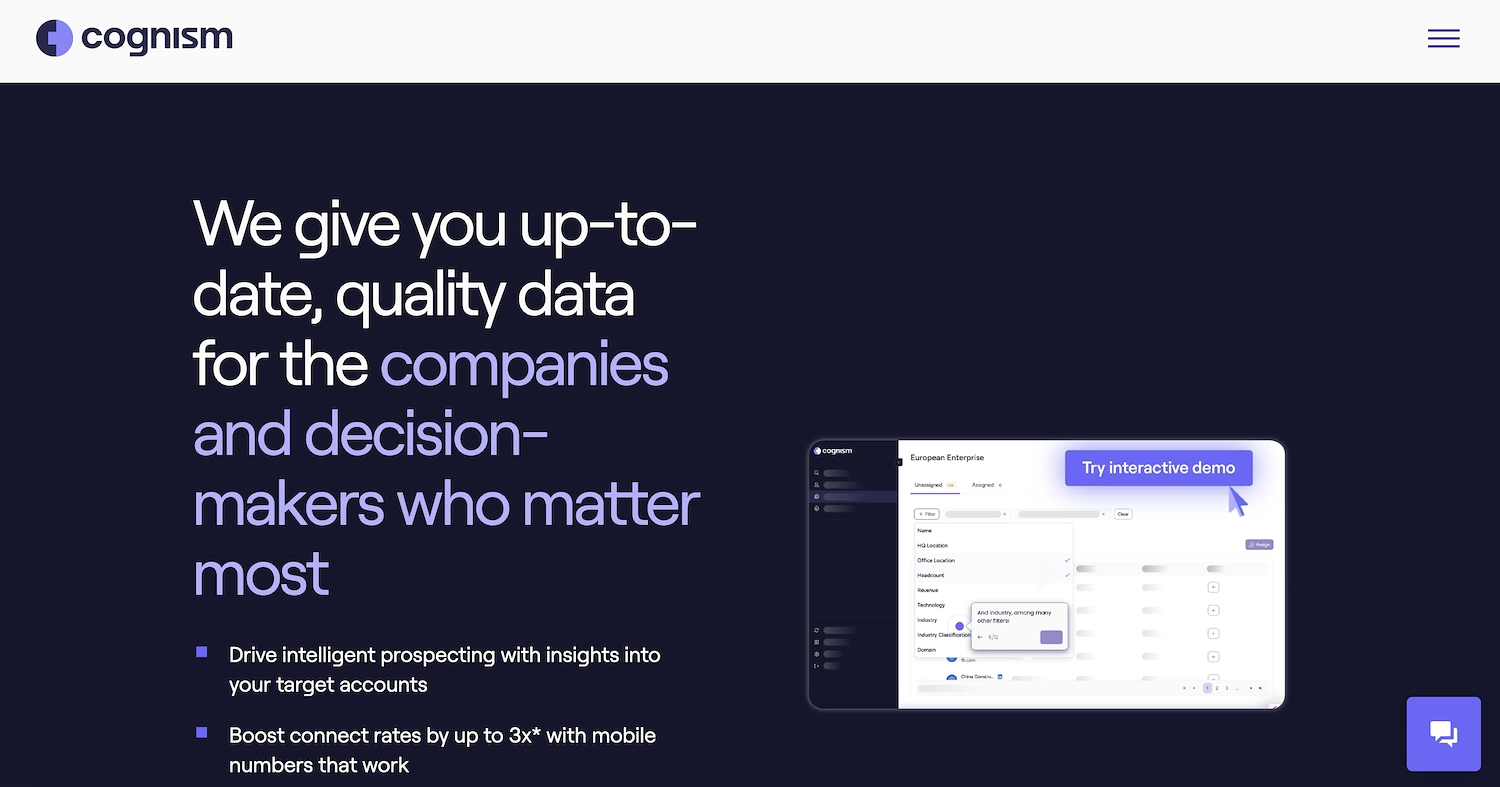
Cognism is a B2B data platform that supplies GDPR-compliant contact and company information, with a focus on the UK and EMEA regions. It helps revenue teams build senior-level contact lists for outreach and enrich existing CRM databases.
The platform uses phone-verified mobile numbers to improve connection rates. It also provides data to trigger outreach based on signals like company funding or new hires, which helps align sales and marketing.
Cognism's Main Features
- Provides phone-verified mobile numbers, known as Diamond Data®, to improve connection rates.
- Identifies buying signals from data on hiring trends, funding rounds, and technology changes.
- Maintains a database of senior decision-makers, screened against Do-Not-Call lists for compliance.
- Offers broad coverage of mobile numbers and email addresses for contacts in the UK and EMEA.
Where Cognism Outperforms Keyplay
Average Review Score: 4.6/5 stars based on 1,033 G2 reviews.
- Cognism provides GDPR-compliant contact data with a strong focus on the UK and EMEA. This is different from Keyplay, which has a more general approach to account list creation.
- It offers phone-verified mobile numbers, which helps increase connection rates for sales teams. Keyplay, in comparison, centers on the identification of ideal accounts, not on providing verified direct-dial information.
- The platform uses buying signals, such as company funding events, to suggest when to reach out. This offers a proactive method, while Keyplay creates lists based on user-defined criteria.
- This tool enriches existing CRM databases to keep contact information current. Keyplay's primary function is the creation of new account lists, not the maintenance of data already in your system.
Potential Drawbacks Compared to Keyplay
- Cognism focuses on providing broad contact data. This approach can be less direct for teams that only need to build and track specific account lists, a task where Keyplay specializes.
- The platform's wide range of features might feel complex for users who want a simple tool for account selection, which is Keyplay's primary function.
- Some users note that its large database can occasionally contain outdated contact details. This may require more team verification than Keyplay's focused account-level data sets.
Budget and Value Comparison
Keyplay offers transparent pricing, with its Growth plan at $12,000 per year and a Scale plan starting at $24,000 annually. Since pricing models can vary significantly between tools, for the most accurate and up-to-date pricing information on Cognism, we recommend visiting Cognism's official website.
4) Clearbit
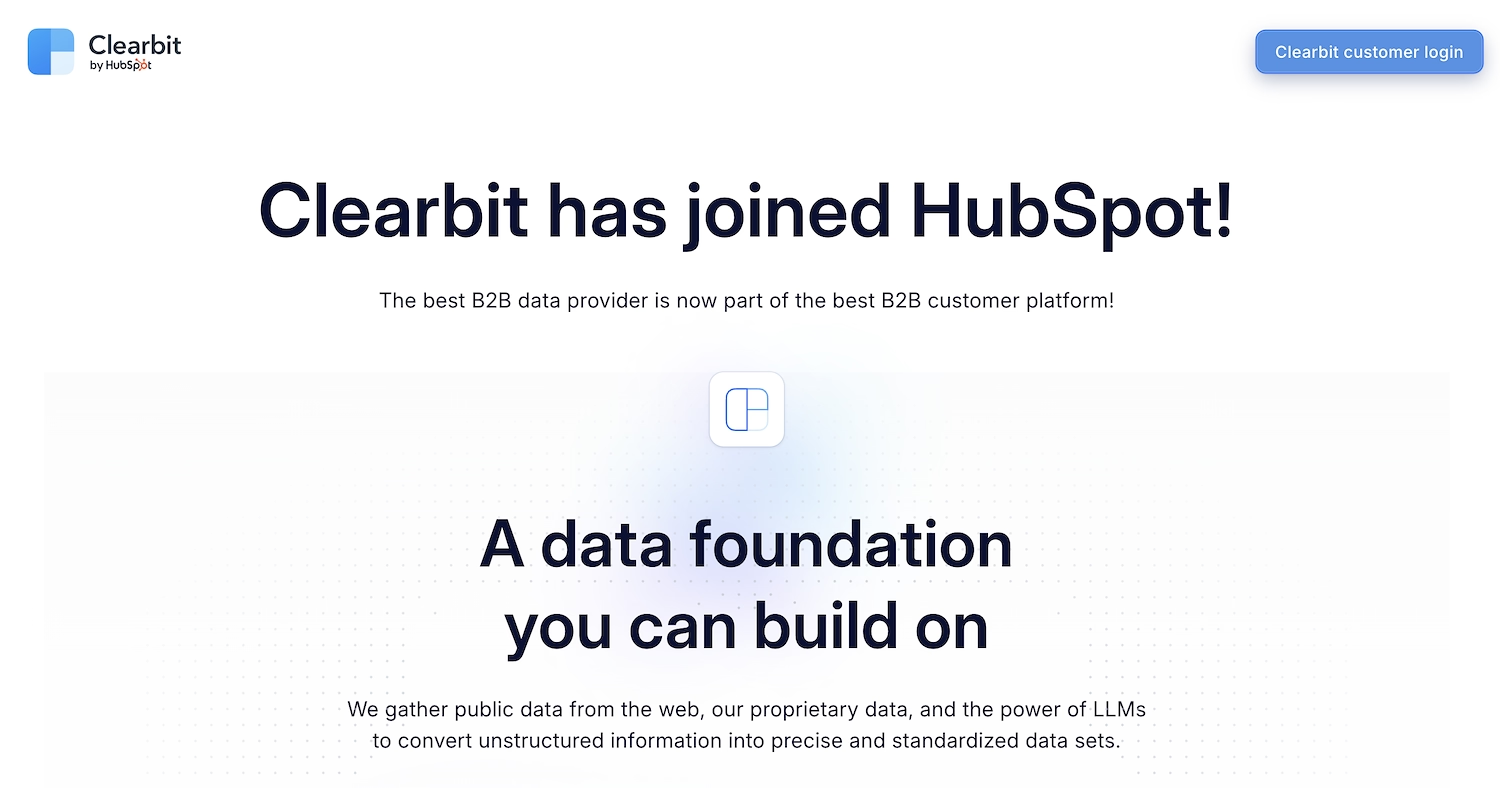
Clearbit is a marketing data platform that offers a B2B database for go-to-market teams. The system enriches contact records with firmographic and demographic data. This information helps teams identify ideal customers, generate new leads, and convert anonymous website visitors into prospects.
Clearbit's Main Features
- Adds firmographic and demographic details to lead, contact, or account records by combining multiple data sources.
- Provides data for real-time lead scoring and routing using deep industry classifications and corporate hierarchy mapping.
- De-anonymizes website traffic to identify visiting companies that match your ideal customer profile.
- Shortens web forms by automatically enriching fields, which can increase conversion rates.
Where Clearbit Outperforms Keyplay
Average Review Score: 4.4/5 stars based on 626 G2 reviews.
- Clearbit enriches your existing lead and contact records with additional data. This differs from Keyplay's focus on building new account lists.
- It identifies anonymous companies that visit your website. This offers a different way to generate leads compared to Keyplay's account-tracking methods.
- The platform provides data for real-time lead scoring and routing. This is a more advanced CRM function compared to Keyplay's focus on account selection.
- This tool shortens web forms by auto-filling company information. This can increase conversions, a feature outside of Keyplay's scope of account list building.
Potential Drawbacks Compared to Keyplay
- Clearbit focuses on data enrichment for existing contacts. This differs from Keyplay, which provides specialized tools to build and track new account lists from scratch.
- Its broad feature set includes lead scoring and website de-anonymization. This can introduce complexity for teams that only need the focused account selection functions found in Keyplay.
- Some users report that its large database can occasionally contain outdated contact details. This may require more team verification compared to Keyplay's focused account-level data sets.
Budget and Value Comparison
Keyplay offers transparent pricing with a Growth plan at $12,000 per year and a Scale plan starting at $24,000 annually. While we've covered key features and use cases in this comparison, pricing models can vary significantly between tools. For the most accurate and up-to-date pricing information, we recommend visiting Clearbit's official website.
5) Lusha
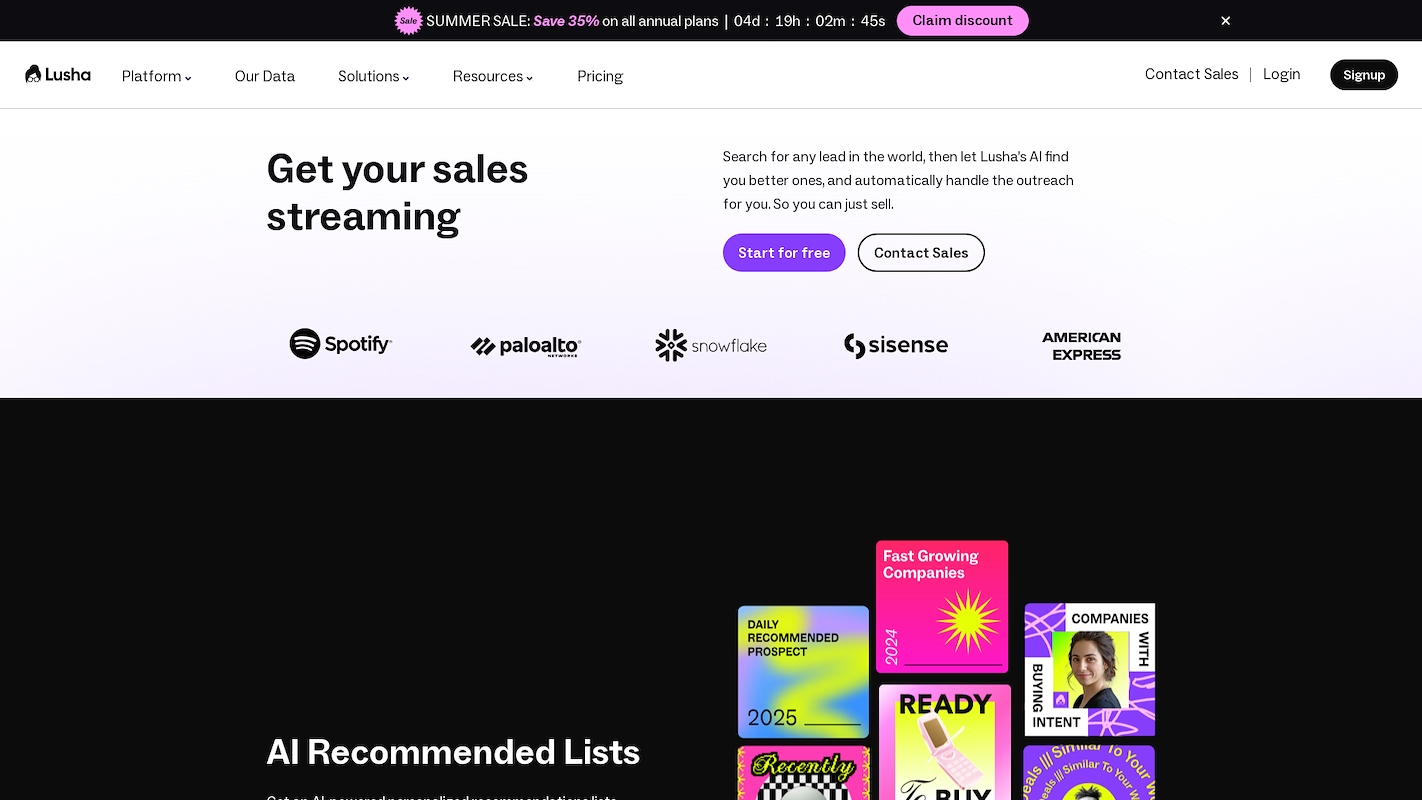
Lusha is a sales intelligence platform that provides B2B contact and company data. Sales teams use it to find phone numbers and email addresses for prospects. The platform supports lead generation with its database.
Users can also enrich their CRM systems with data to maintain contact accuracy. The tool serves sales professionals who need direct contact information for outreach campaigns.
Lusha's Main Features
- Records and analyzes sales meetings to provide insights.
- Automates and personalizes email sequences using AI-generated copy.
- Captures contact data directly from LinkedIn profiles and company websites.
- Delivers real-time notifications for buyer intent triggers and other signals.
Where Lusha Outperforms Keyplay
Average Review Score: 4.3/5 stars based on 1,516 G2 reviews.
- Lusha offers direct contact data, such as phone numbers and emails, for immediate outreach. This differs from Keyplay's approach, which centers on the identification of target accounts, not the specific contacts within them.
- The platform uses AI Prospect Playlists to automatically create and update lead lists. This offers a dynamic alternative to Keyplay's method of manually building specific account lists.
- This tool analyzes sales meetings to provide coaching insights. This is a feature for performance review, whereas Keyplay's tools are for the initial account selection phase.
- It automates email sequences with AI-generated copy to support outreach efforts. This is a step beyond Keyplay's functionality, which is centered on identifying and selecting accounts before outreach begins.
Potential Drawbacks Compared to Keyplay
- Lusha's focus is on individual contact data. This approach is different from Keyplay, which provides specialized tools to build and track specific account lists for go-to-market teams.
- Its broad feature set includes outreach automation and AI playlists. This can introduce complexity for teams that only need the focused account selection functions found in Keyplay.
- Some users report that its large database can occasionally contain outdated contact details. This may require more team verification compared to Keyplay's focused account-level data sets.
Budget and Value Comparison
Lusha offers a flexible per-user pricing model with a free tier and paid plans starting at $36 per month, making it accessible for individuals or small teams. In contrast, Keyplay’s pricing is team-based, with annual plans starting at $12,000, which is better suited for larger organizations. For the most current pricing, visit Lusha's official website.
Try 11x for Your Digital Sales Workers
If you want to add digital workers to your sales process, 11x provides a platform to do so. Its autonomous agents handle prospecting and outreach, allowing your team to focus on closing deals. Explore the platform to see how it can support your sales operations.
At 11x, we use AI to manage your sales process. Our agent Alice finds accounts and handles outreach, while Julian qualifies leads and books meetings. We combine data, outreach, and email warmup in one platform, replacing multiple tools in your stack.
Book a demo to see the platform in action.
6) Seamless.AI
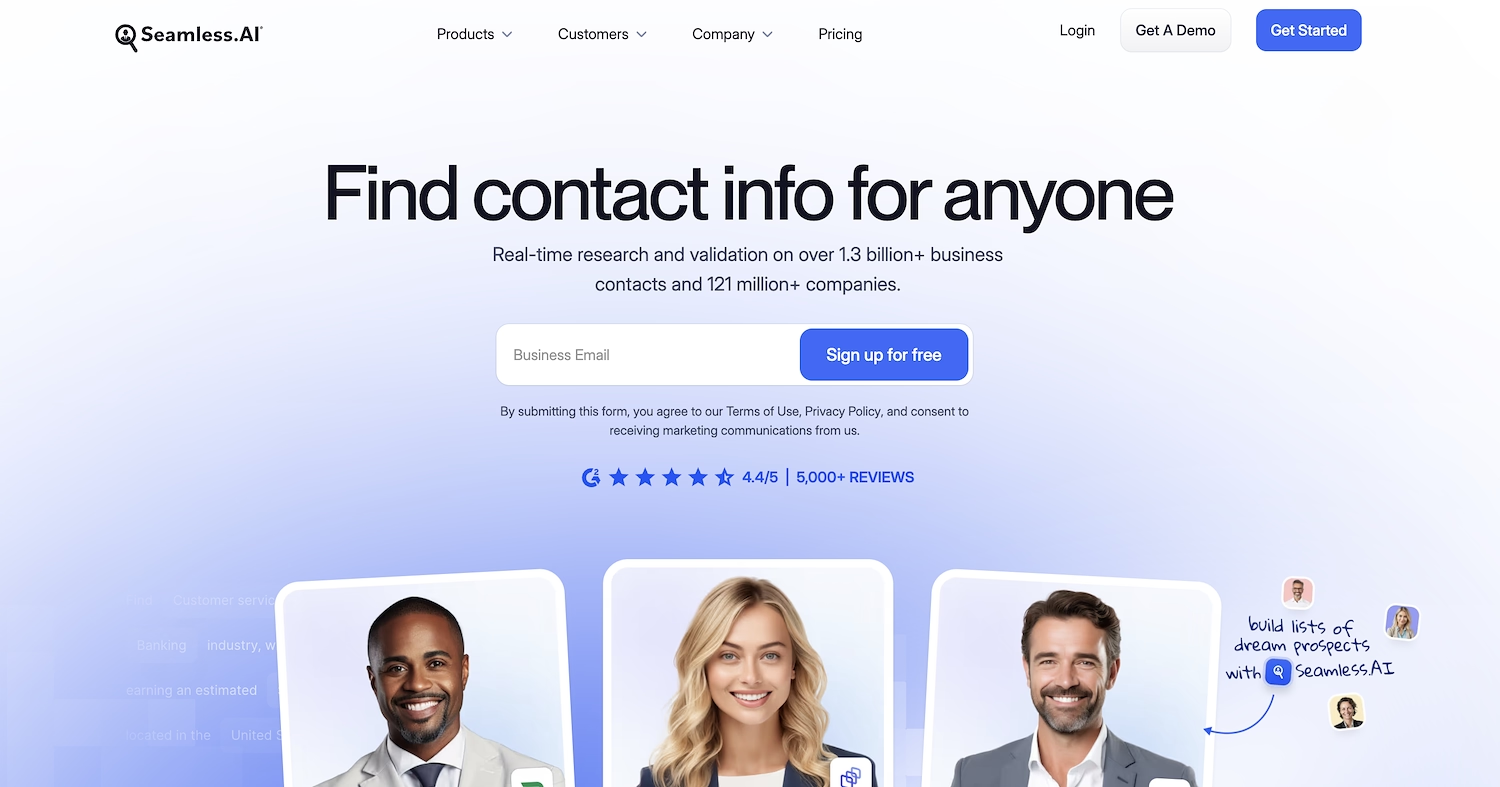
Seamless.AI is a sales intelligence platform with a B2B database for go-to-market teams. It helps users find contact and company information to create prospect lists. The system supports lead generation and sales outreach through its data on potential customers.
It acts as a resource for sales professionals who need to identify new opportunities and connect with decision-makers.
Seamless.AI's Main Features
- Provides buyer intent data to surface prospects who are ready to buy.
- Monitors job changes for customers and prospects and automatically delivers new contact information.
- Generates research and personalized messages using AI pitch intelligence.
- Enriches data by turning an email, phone number, or domain into a complete record.
Where Seamless.AI Outperforms Keyplay
Average Review Score: 4.4/5 stars based on 5,067 G2 reviews.
- Seamless.AI provides buyer intent data to surface prospects who are ready to buy. This is a different approach from Keyplay, which focuses on building account lists based on user-defined filters.
- The platform tracks job changes for customers and prospects, then automatically delivers new contact information. This is a feature not found in Keyplay's account-centric model.
- This tool uses AI to generate research and personalized messages for outreach. This supports the communication step, which is beyond Keyplay's scope of account selection.
- It functions as a real-time search engine for individual contact data like emails and phone numbers. This is a more granular approach than Keyplay, which operates at the account level to build lists.
Potential Drawbacks Compared to Keyplay
- Seamless.AI acts as a search engine for individual contacts. This differs from Keyplay, which offers a focused workflow to create and track specific account lists based on defined ideal customer profiles.
- The platform's wide range of features, like buyer intent data and job change tracking, might be more than what a team needs. Keyplay provides a simpler, more direct solution for its specific purpose of account selection.
- Some users report that the large database in Seamless.AI can sometimes have outdated contact information. This may require more verification from a team compared to Keyplay, which centers on account-level data to build lists.
Budget and Value Comparison
Keyplay offers transparent pricing with a Growth plan at $12,000 per year and a Scale plan starting at $24,000 annually. While we've covered key features and use cases in this comparison, pricing models can vary significantly between tools. For the most accurate and up-to-date pricing information, we recommend visiting Seamless.AI's official website.
7) RocketReach
RocketReach is a platform that provides access to a large database of professional and company contact information. Sales and recruiting teams use it to find email addresses and phone numbers for lead generation and outreach. The tool helps users connect with decision-makers.
The system functions as a search engine for contacts, allowing users to look up individuals or build lists based on specific criteria. It also offers a browser extension to find information from company websites and social profiles.
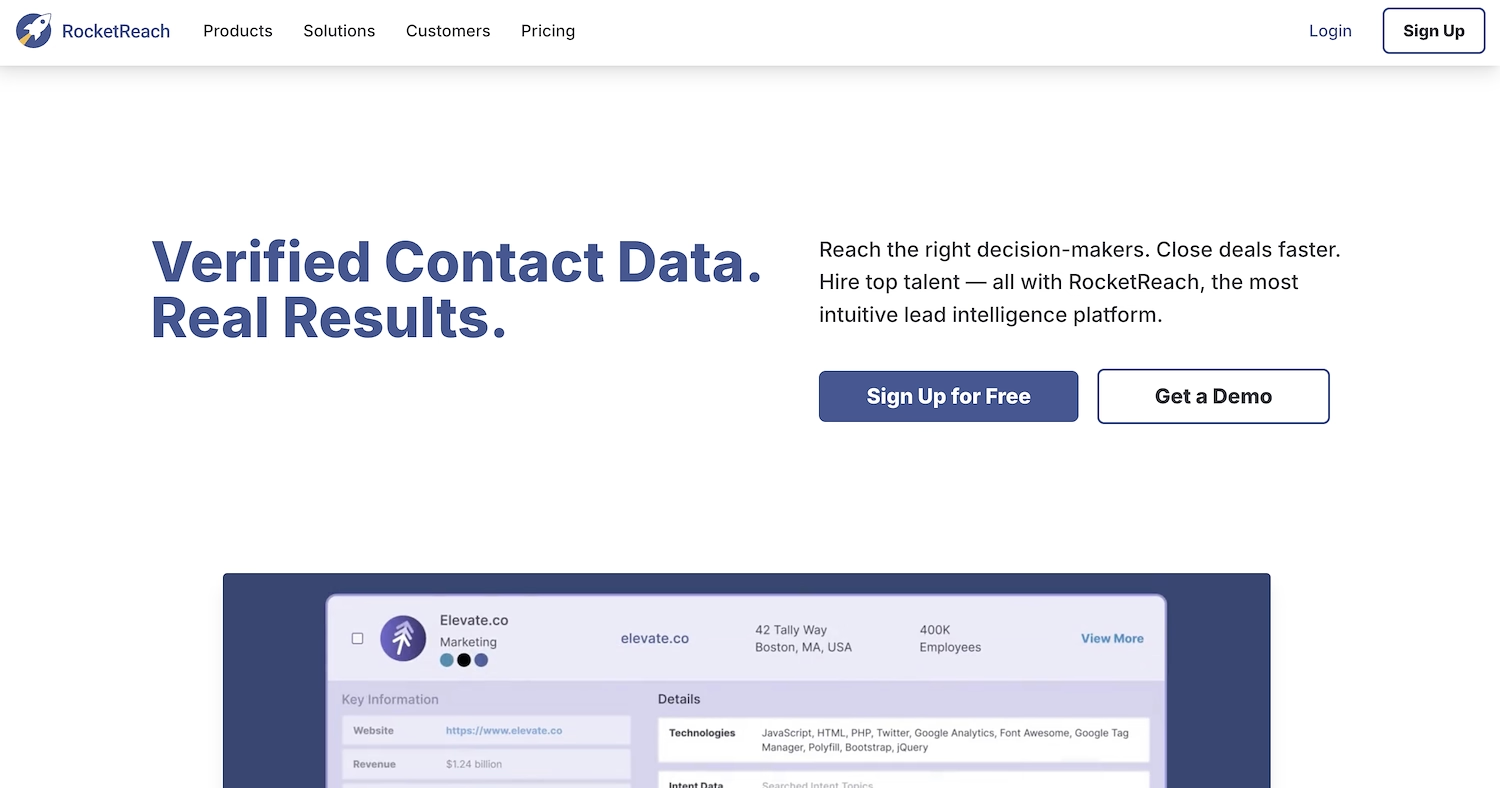
RocketReach provides a large database of professional and company contact information. Sales and recruitment teams use it to find email addresses and phone numbers for lead generation and outreach. The tool helps users connect with decision-makers.
Its system is a search engine for contacts. Users look up individuals or build lists from specific criteria. A browser extension also finds information from company websites and social profiles.
RocketReach's Main Features
- Provides access to a large database of professional and company contact information, including email addresses and phone numbers.
- Functions as a search engine for contacts, allowing users to look up individuals or build lists based on specific criteria.
- Offers a browser extension to find contact information from company websites and social profiles.
Where RocketReach Outperforms Keyplay
Average Review Score: 4.4/5 stars based on 918 G2 reviews.
- RocketReach provides direct contact information like emails and phone numbers for individuals. This is different from Keyplay, which focuses on building lists of target accounts.
- It offers access to a database of over 700 million professionals. This provides a broader pool for prospecting than Keyplay's more focused account selection process.
- The platform includes a browser extension to find contact details directly from social profiles and websites. Keyplay does not have a similar feature for on-the-fly data capture.
- This tool has an API to integrate its contact data into other systems like a CRM. This is a different function compared to Keyplay's primary use as a standalone account list builder.
Potential Drawbacks Compared to Keyplay
- RocketReach focuses on finding individual contact details. This is different from Keyplay, which helps teams build and track strategic account lists based on specific criteria, making it less suited for account-based strategies.
- The platform acts as a search engine for contact data. It does not offer the same account tracking and monitoring features that Keyplay provides for following a curated list of target companies over time.
- Some users report that the contact information in its large database can sometimes be outdated. This may require more verification compared to Keyplay, which centers on building lists at the account level.
Budget and Value Comparison
RocketReach offers a flexible pricing model with a free tier and monthly plans starting at $99, which is suitable for individuals or small teams. Keyplay’s pricing is team-based, with annual plans starting at $12,000, aligning with larger company budgets for strategic account selection.
8) UpLead
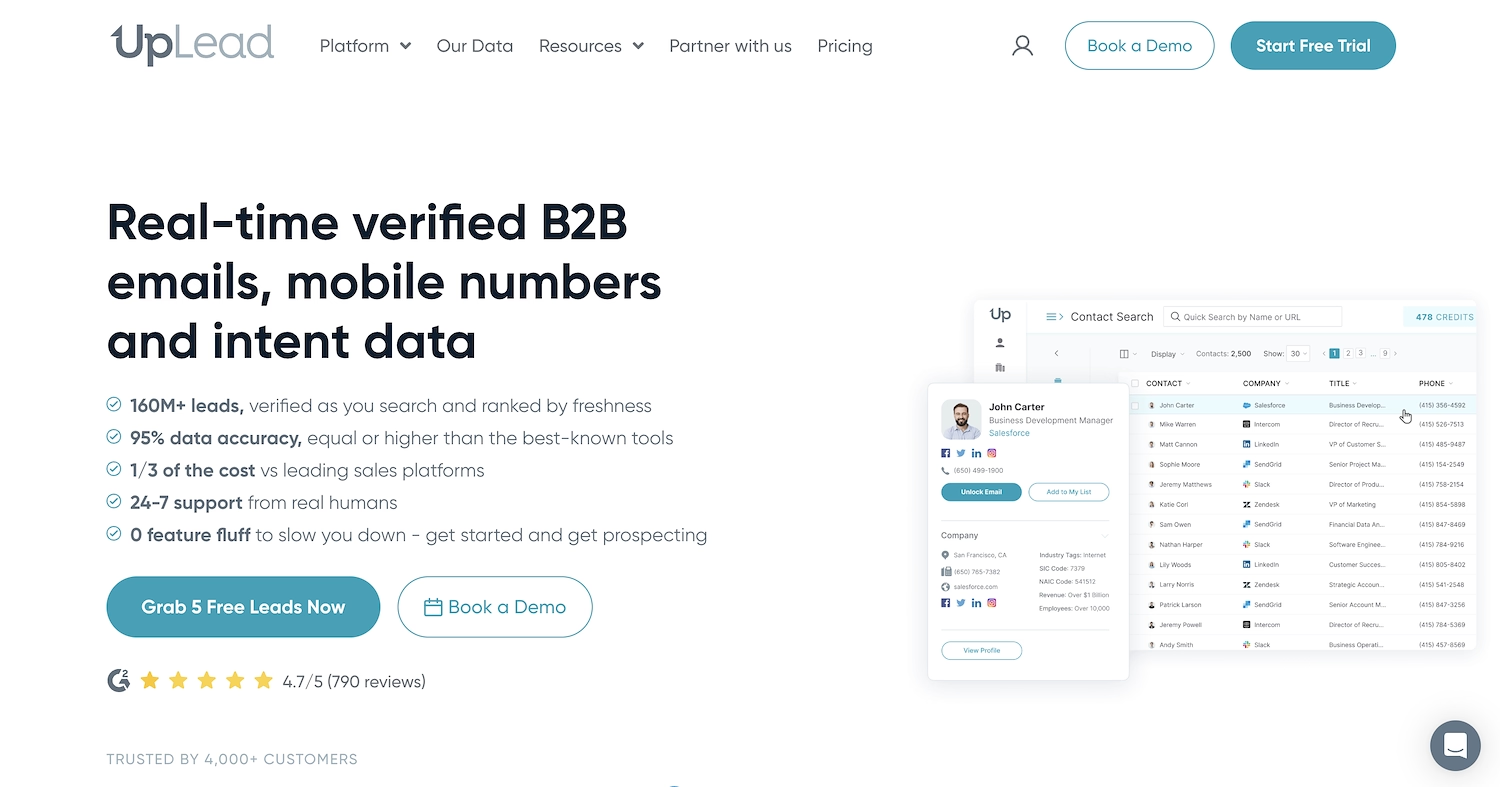
UpLead is a B2B prospecting platform with a database of contacts and companies. It offers real-time email verification to ensure data accuracy. Sales and marketing teams use the tool to build targeted lead lists for outreach. The system also provides data enrichment to keep CRM records up to date.
UpLead's Main Features
- Offers real-time email verification to ensure data accuracy for outreach campaigns.
- Uses over 50 search filters, including intent data, to find and build lists of in-market buyers.
- Provides data enrichment to clean and update existing contact and company records in your CRM.
- Integrates with CRMs like Salesforce and HubSpot, as well as Zapier, to automate data workflows.
Where UpLead Outperforms Keyplay
Average Review Score: 4.7/5 stars based on 797 G2 reviews.
- UpLead offers real-time email verification to ensure data accuracy for outreach campaigns. This is different from Keyplay, which focuses on identifying target accounts rather than validating individual contact details.
- The platform uses over 50 search filters, including intent data, to find in-market buyers. This provides a different way to prioritize leads compared to Keyplay's method of building lists from user-defined filters.
- It provides data enrichment to clean and update existing contact and company records in your CRM. This function differs from Keyplay, which centers on creating new account lists from scratch.
- This tool integrates with CRMs like Salesforce and HubSpot to automate data workflows. This is a different approach from Keyplay, which is primarily used as a standalone tool for account list building.
Potential Drawbacks Compared to Keyplay
- UpLead provides individual contact data with real-time verification. This approach differs from Keyplay, which helps teams build and track strategic account lists. For account-based strategies, this focus on contacts may be less direct.
- The platform is designed for prospecting and finding new leads. It does not have the same dedicated account-tracking features as Keyplay, which allows teams to monitor a curated list of target companies over time.
- Some teams may find the platform's 50+ search filters and enrichment tools more complex than needed. Keyplay offers a more direct workflow specifically for building and managing account lists without the extra features.
Budget and Value Comparison
UpLead offers a flexible pricing model with a free trial and monthly plans starting at $99, which is suitable for individuals or small teams. Keyplay’s pricing is team-based, with annual plans starting at $12,000, aligning with larger company budgets for strategic account selection. For the most current pricing, visit UpLead's official website.
9) Demandbase One
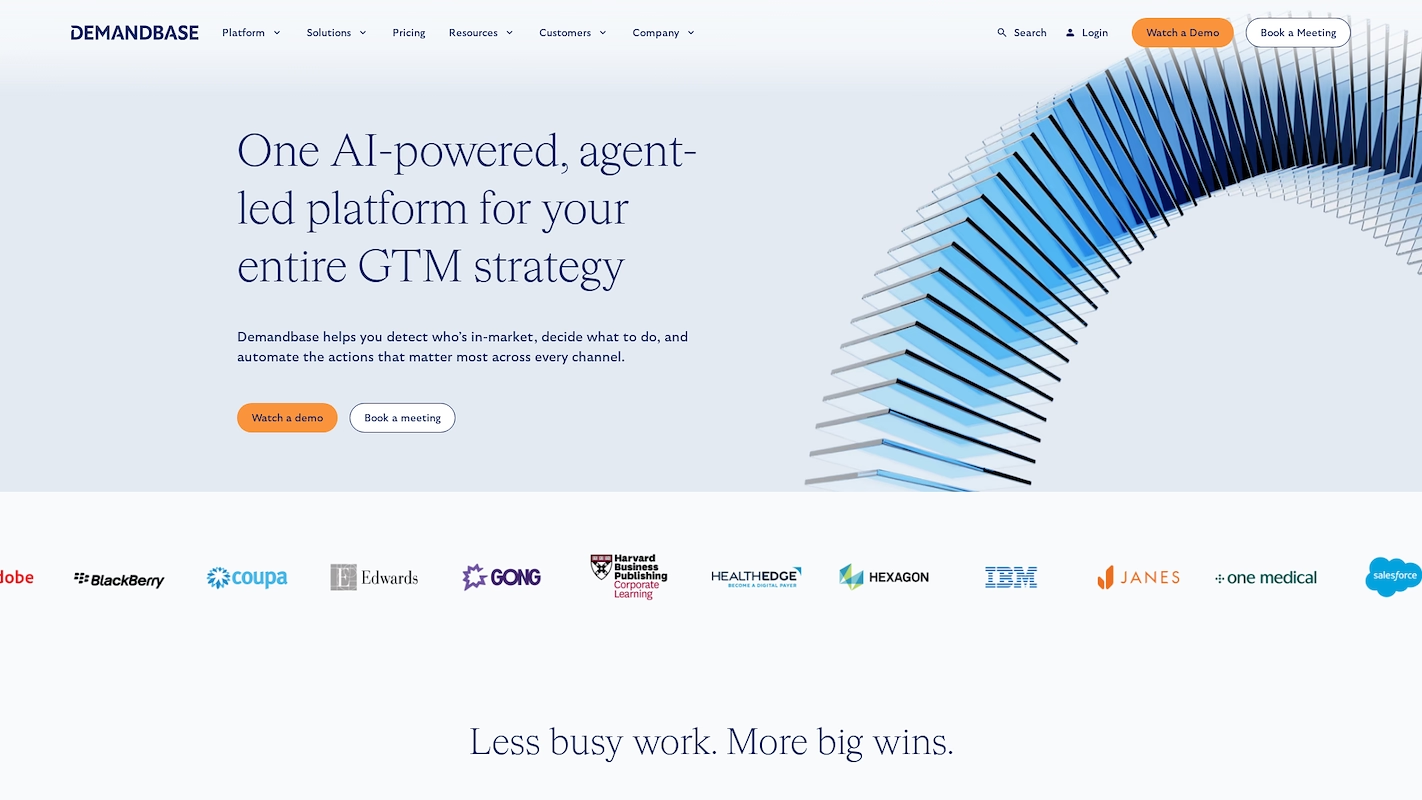
Demandbase One is a go-to-market platform for B2B organizations. It uses account intelligence to help sales and marketing teams find and engage their target customers. The platform provides data and tools to support account-based marketing strategies.
It helps teams identify companies that show purchase intent. This function supports lead generation efforts and helps build a database of relevant B2B prospects for outreach.
Demandbase One's Main Features
- Builds lead lists using available contact and company data.
- Integrates with CRM and marketing automation platforms.
- Cleans and enriches existing data to maintain accuracy.
- Provides account-level insights and lead intelligence.
Where Demandbase One Outperforms Keyplay
Average Review Score: 4.4/5 stars based on 1,843 G2 reviews.
- Demandbase One uses account intelligence to find companies that show purchase intent. This offers a proactive approach compared to Keyplay, which builds lists based on static user filters.
- It integrates with CRM and marketing automation platforms to support a connected GTM process. This is different from Keyplay, which operates mainly as a separate tool for account selection.
- The platform cleans and enriches existing data inside your CRM. This helps maintain data accuracy over time, a feature not central to Keyplay's focus on building new lists.
- This tool allows for account-based advertising and marketing orchestration. This capability lets teams engage target accounts directly, a step beyond Keyplay's function of just creating the account list.
Potential Drawbacks Compared to Keyplay
- Demandbase One is a comprehensive platform, and some users report a steep learning curve. This is different from Keyplay, which offers a more direct workflow specifically for account selection.
- The platform's broad capabilities for advertising and orchestration can be excessive for teams that only need to build account lists. Keyplay provides a more specialized tool for that specific task.
- Some users note that the setup process is more involved and can take longer. In comparison, Keyplay is a more targeted solution that teams can adopt more quickly for its specific function.
Budget and Value Comparison
Keyplay offers transparent pricing with a Growth plan at $12,000 per year and a Scale plan starting at $24,000 annually. While we've covered key features and use cases in this comparison, pricing models can vary significantly between tools. For the most accurate and up-to-date pricing information, we recommend visiting Demandbase One's official website.
10) 6sense Revenue AI
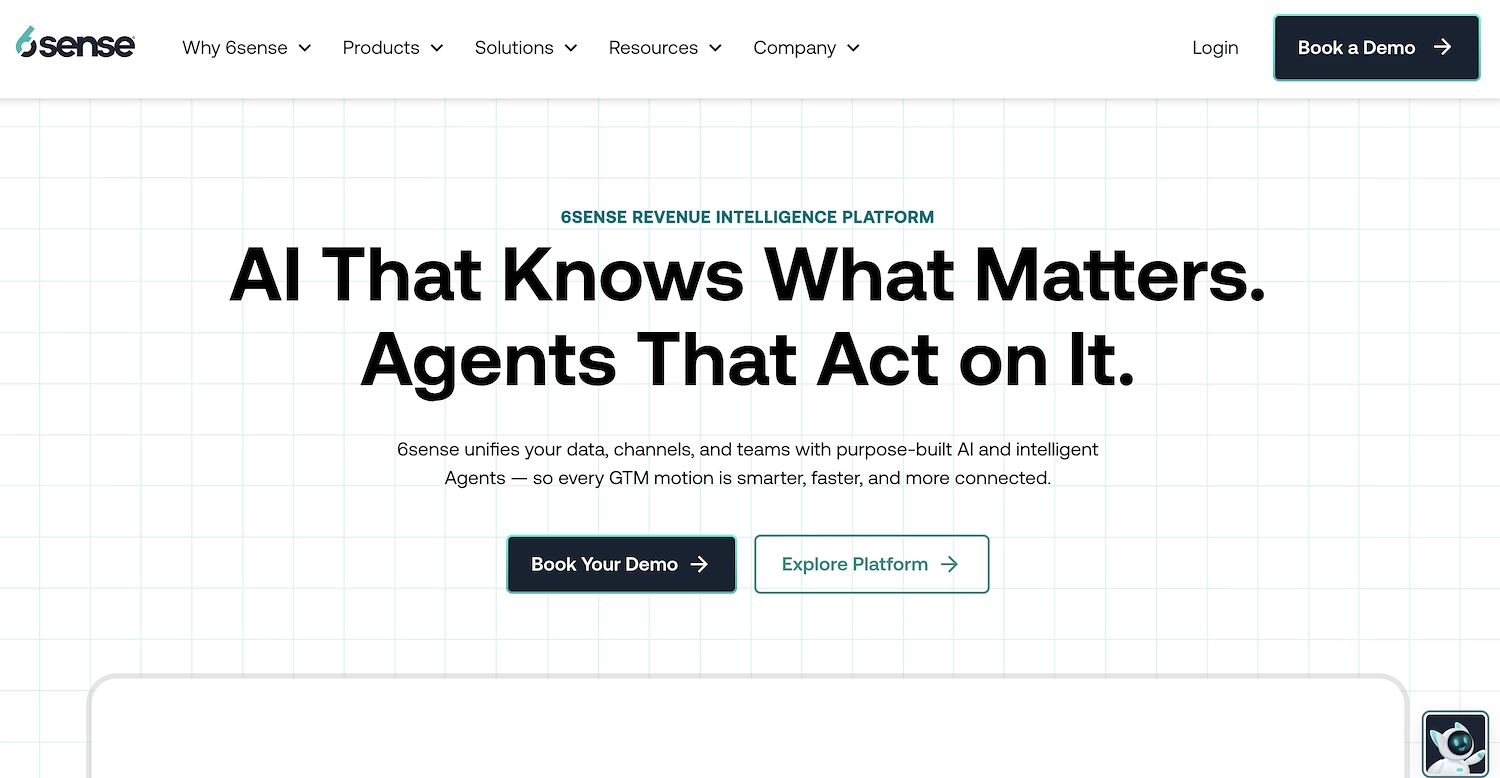
6sense Revenue AI is a platform that helps B2B companies find accounts with purchase intent. It uses AI to analyze signals across the web, which informs sales and marketing teams about which accounts are in-market. This supports lead generation and provides access to a B2B database for outreach.
6sense Revenue AI's Main Features
- Uses buyer intent data integration to identify accounts that are actively researching solutions.
- Offers website personalization to tailor content for visitors from target accounts.
- Provides ad network integrations to run targeted advertising campaigns.
- Integrates with marketing automation platforms to connect data and workflows.
Where 6sense Revenue AI Outperforms Keyplay
Average Review Score: 4.3/5 stars based on 1,086 G2 reviews.
- 6sense Revenue AI uses buyer intent data to identify accounts that are actively researching solutions. This offers a more dynamic approach to prospecting compared to Keyplay, which builds lists from user-defined filters.
- The platform offers website personalization to tailor content for visitors from target accounts, a feature for engagement that is outside Keyplay's focus on initial account selection.
- It allows users to run targeted advertising campaigns through ad network integrations, a function that goes beyond Keyplay's role of creating account lists.
- This tool integrates with marketing automation platforms to connect data and workflows, whereas Keyplay operates more as a standalone tool for account selection.
Potential Drawbacks Compared to Keyplay
- 6sense Revenue AI is a comprehensive platform with features like advertising and website personalization. Some users report a steep learning curve, which is different from Keyplay's more direct workflow for account selection.
- The platform's focus on intent data and AI-driven insights is for a broad revenue strategy. This approach is less direct than Keyplay, which specializes in helping teams build and track specific, user-defined account lists.
- Its broad capabilities can be more than what a team needs for simple account list building. Keyplay offers a more focused tool for this specific task, which some teams may find quicker to adopt.
Budget and Value Comparison
Keyplay offers transparent pricing with a Growth plan at $12,000 per year and a Scale plan starting at $24,000 annually. In contrast, 6sense Revenue AI does not publish its pricing and requires a custom quote. For the most accurate and up-to-date pricing information, we recommend visiting the 6sense Revenue AI's official website.
Which One Should You Go With?
The right Keyplay alternative depends on your team's specific needs and budget. This guide reviewed several options to help you find a suitable platform for your go-to-market strategy.
If your goal is to automate sales tasks, 11x offers a different approach. Its AI agents can handle prospecting, outreach, and lead qualification, which allows your sales team to focus on higher-value activities like closing deals.




